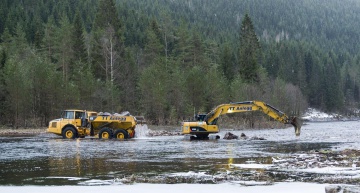Case study:Environmental design Mandalsvassdraget: Difference between revisions
No edit summary |
No edit summary |
||
| Line 61: | Line 61: | ||
{{Additional Documents end}} | {{Additional Documents end}} | ||
{{Additional links and references header}} | {{Additional links and references header}} | ||
{{Additional links and references | |||
|Link=https://docplayer.me/33318388-Multi-kriterie-analyse-av-kompenserende-tiltak-for-regulerende-okosystemtjenester-ecomanage.html | |||
|Description=Presentation of research on weighing of different interests in Mandalselva (CEDREN/EcoManage project), David N. Barton et al. 2015 | |||
}} | |||
{{Additional links and references footer}} | {{Additional links and references footer}} | ||
{{Supplementary Information}} | {{Supplementary Information}} | ||
{{Toggle content end}} | {{Toggle content end}} | ||
Revision as of 20:40, 13 January 2020
This case study is pending approval by a RiverWiki administrator.
Project overview
| Status | Complete |
|---|---|
| Project web site | |
| Themes | Fisheries, Hydropower, Hydromorphology |
| Country | Norway |
| Main contact forename | Aleksander |
| Main contact surname | Andersen |
| Main contact user ID | |
| Contact organisation | Agder Energi |
| Contact organisation web site | http://https://www.ae.no/ |
| Partner organisations | NINA, Sintef, Norce Research, Skandinavisk Naturovervåking |
| Parent multi-site project | |
| This is a parent project encompassing the following projects |
No |
Project summary
Mandalselva is regulated for hydropower production since 1947 and this has impacted the conditions for Atlantic salmon in this river. The project "Miljødesign Mandalselva" used the concept of Environmental Design as described in the "Handbook for environmental design in regulated salmon river (Forseth and Harby 2013) and was accompanied by thorough research efforts in order to study which measures would be suitable to improve the conditions for salmon and at the same time to take into account hydropower production. This researcj was led by the Norwegian Institute for Nature Research (NINA) and conducted in cooperation with SINTEF Energy, Norce Research and Skandinavisk Naturovervåking. It included i.a. a trade-off analysis between the production of Atlantic salmon and the production of hydropower by examining the use of several physical mitigation measures and changes in release of water. Local stakeholders and public natural resource management were involved by means of a counceling group. As a result, nine weirs in the river were removed and further habitat improving measures were put in place (e.g. installation of gravel habitat).
Monitoring surveys and results
Monitoring surveys and results are expected to be published soon.
Lessons learnt
expected soon...
Image gallery
|
Catchment and subcatchment
Site
Project background
Cost for project phases
Reasons for river restoration
Measures
MonitoringHydromorphological quality elements
Biological quality elements
Physico-chemical quality elements
Any other monitoring, e.g. social, economic
Monitoring documents
Additional documents and videos
Additional links and references
Supplementary InformationEdit Supplementary Information
| ||||||||||||||||||||||||||||||||||||||||||||||||||||||||||||||||||||||||||||||||||||||||||||||||||||||||||||||||||||||||||||||||||||||||||||||||||||||||||||||||||||||||||||||||||||

